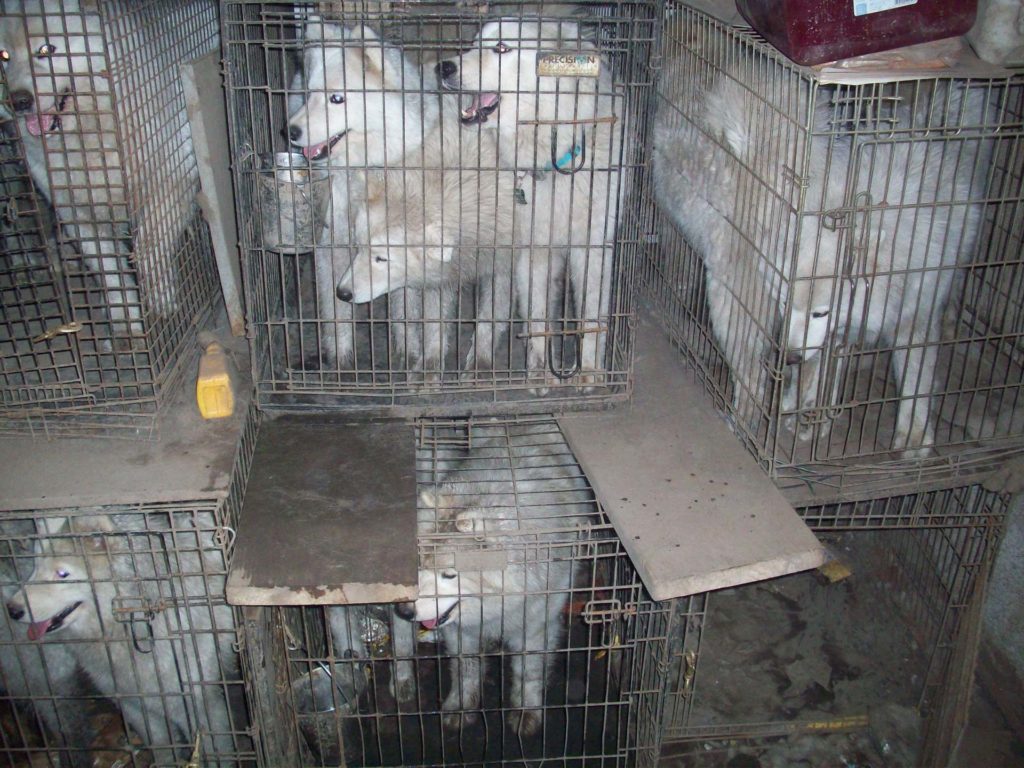HOW MUCH IS THAT DOGGIE IN THE WINDOW?

This is an actual photo taken by animal control at a seizure in 2016.When you buy from a pet store you support people who treat dogs like this.
Each year, millions of Americans fall in love with “that puppy in the window.” They are cuddly. They are adorable. And you must have one. But let the buyer beware. There’s another side of the pet shop business that keeps those puppies coming and it has nothing to do with love. Its about a multi-million dollar industry driven by puppy love. Dateline NBC has featured a story about the cruelties that exist with in the commercial pet trade and the puppy mills that supply those little wet noses to the pet stores in this city and around the country.
What Are Puppy Mills?
A puppy mill is a breeding facility that mass-produces purebred puppies. They are typically sold at seven to eight weeks of age to brokers and retail operations across the U.S. The dams are over bred, inbred, receive minimal veterinary care, poor quality food and shelter, lack necessary socialization with humans, and live in tight, overcrowded cages. To the unsuspecting consumer, this situation frequently means buying a puppy facing an assortment of veterinary medical problems or harboring genetically borne diseases that do not appear until years later. On an even sadder note, these breeding dogs are forced to live in puppy mills for their whole lives so that they can continue to produce more puppies. Repeatedly bred, most of these “brood bitches” are killed once their ability to reproduce declines.
Estimates indicate there are over 4,000 of these puppy mills currently operating in the United States. Many of them are repeatedly sited for violations of the federal Animal Welfare Act (AWA) and other United States Department of Agriculture (USDA) regulations. The agency uses a force of approximately 70 inspectors to enforce its code–an average of 57 facilities per agent per year that need inspection. Although all 50 states have anti-cruelty laws designed to thwart neglect and abuse of dogs in puppy mills, such laws are seldom enforced in rural areas where most puppy mills are located.
The Pet Store Link
Puppy-mill dogs are the “inventory” of the retail pet store operations. According to the Pet Industry Joint Advisory Council (PIJAC), approximately 3,500 to 3,700 of the 11,500 to 12,000 U.S. pet stores sell cats and dogs. PIJAC also estimates that pet stores sell 300,000 to 400,000 puppies every year. In 1984, the General Accounting Office, the investigative branch of the U.S. government, found major deficiencies in the enforcement of the AWA rules concerning puppy mills. Despite promises to improve its inspection process, the USDA has yet to live up to its promises.
Doggie Lemon Laws
Many states are responding to the horrific practices of puppy mills by enacting “lemon laws” that protect consumers who buy puppies. Sixteen states now have laws or regulations that allow consumers to receive reimbursement of veterinary bills or full refunds when a sick puppy is purchased. While these laws place a limited onus on pet stores and puppy mills to sell healthy puppies, and theoretically improve conditions for their breeding facilities, they do not adequately protect the animals who suffer in these establishment.
What can you do?
It’s simple: Never buy a puppy from a pet store.
